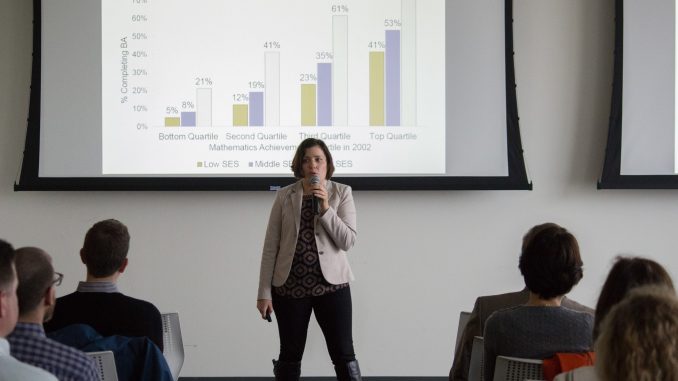
At Dr. Sara Goldrick-Rab’s presentation for the Dean’s Symposium event, she told a group of college students what they already know: the financial aid system does not work.
“We have to understand that it’s broken in 100 ways, and then we can start rebuilding it,” Goldrick-Rab said Nov. 19 in Morgan Hall. “But I don’t think most people realize it’s that broken. I think most people just think it’s cracked—this thing is broken into shards, and it’s hurting people.”
Goldrick-Rab, the 2014 recipient of the Early Career Award from the American Educational Research Association, has researched the detrimental effects of the current financial aid system in the United States, as well as ways to make college more affordable. She also co-edited a book titled “Reinventing Financial Aid: Charting a New Course to College Affordability,” and will soon release a book, “Paying the Price: College Costs and the Betrayal of the American Dream.”
She currently works as a professor of educational policy studies and sociology at the University of Wisconsin-Madison, and is also the founding director of the Wisconsin HOPE Lab, a team of about 30 professionals researching college affordability.
“We have spent over $3 trillion on financial aid problems, and income inequality has grown,” Goldrick-Rab said. “It’s not the fault of financial aid, that’s not what I’m saying. I’m just saying it’s clearly not getting the job done.”
While earning her Ph.D. in sociology from the University of Pennsylvania in 2004, Goldrick-Rab worked with Kathleen Shaw, a former assistant professor of education at Temple. Now, Shaw is the executive director of Research for Action, a Philadelphia-based nonprofit education research organization.
While other Penn mentors focused on research and writing articles, Shaw was dedicated to being more active with her efforts, Goldrick-Rab said.
“[Shaw] was like, ‘Let’s go to a community college and let’s fix something,’” she said.
Goldrick-Rab said she admires Temple for programs like Fly in 4, an initiative that helps students graduate in four academic years.
“This is an innovative place,” she said. “Temple is doing things, and it’s harder to pick on this place than a lot of other places.”
But she recognizes the faults in colleges across the nation—one major problem is the difficulty of getting a good job as a college student.
“When I say, ‘a good job,’ it means it has enough hours, they don’t lay you off all of a sudden and you don’t get in trouble because your class schedule changes,” Goldrick-Rab said. “They pay you terribly, and it’s ridiculous.”
Through research Goldrick-Rab has conducted about work-study programs, she has had the opportunity to connect with many student workers. Now, she feels like she has a much better understanding of the struggles student workers face, like working late hours because of the increased pay.
Goldrick-Rab feels there is not enough work-study funding and it is nearly impossible for students to support themselves while attending college full-time. She said one in five students qualify as suffering from hunger or malnutrition, and 13 percent qualify as homeless.
“If we aren’t covering living costs, then we are not covering students,” she said. “Students have to live to be able to attend college.”
She explained an array of problems surrounding the financial aid system, but the central message was simple.
“The financial aid model that we built way back then does not work,” Goldrick-Rab said. “I’m frankly tired of waiting—we have to do something else.”
Jenny Stein can be reached at jenny.stein@temple.edu.



Be the first to comment